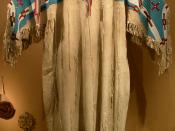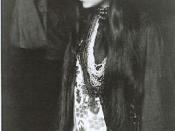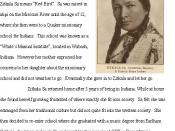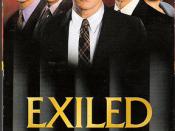When Banishment is Morally Defensible The banishment acts in "The Soft-hearted Sioux" and in "The Outcasts of Poker Flat" are very complex and contain different reasoning's on why the certain characters were exiled from their homes. In one story the character is banished because of his difference in religious beliefs, and in the other a group of citizens are exiled because of the actions of a town against the current criminal activities inside of it. The stories both focus on the characters that are exiled and how all of the characters come to a tragic end.
In "The Soft-hearted Sioux" a young man is faced with the dilemma of believing in the white religion instead of his traditional Indian beliefs. He goes back to his tribe to try and convert others to his newly discovered religion and disputes with the medicine man. This is his major mistake, not only has he gone against his own traditional roots and upbringing, but is also trying to convince others of his race that what they believe in is not appropriate.
Because of his actions him and his family are exiled away from the tribe in the dead of winter, forcing the man to try and hunt for his father even though he does not contain the knowledge of how. In deserting his background toward another set of beliefs he ends up betraying his father and his self. In this story the basis of the exile was that the young man went against the medicine man that represented what the young man had abandoned. In the end this abandonment is what causes his father's, and his own death.
In " The Outcasts of Poker Flat" the main exile is named Mr. Oakhurst, but he is not alone in his separation. He is companioned with other somewhat seedy members of a town that intends to rid itself of people who are of the criminal association. Mr. Oakhurst and his group run into a couple that are exiled from another town because of their love for each other without the father's consent. Both of these groups are forced into a cabin and remain in this dwelling with dwindling food supplies, and harsh winter weather outside. In the end Mr. Oakhurst and his friends are finally met to a tragic end, because of their banishment into the harsh environment.
In " The Soft-hearted Sioux" the banishment was more necessary and morally justified than in "The Outcasts of Poker Flat". This is because the young man was posing a serious threat to the life and well being of his Indian tribe. The medicine man knew that the young man was trying to convince others that his religion was the only true one and knew that this was damaging not just to the individual, but to the traditions and culture of the tribe altogether. The medicine man was not exiling the young man to kill him, but was banishing him for the safety of the Indian values and beliefs that the boy was threatening to diminish.
The outcasts from Poker Flat however, were mostly banished for their life style, not because of anything specifically criminal that they had done. A gambler, two prostitutes, and a regular drunk of the town are thrown out for the retaliation of a major robber from the town's welfare. The other two outcasts who appear in the story that are exiled from another town left in order to be together even though the girls father did not approve. The way a group of people chooses to live is a poor and unsubstantial reason to force that group of people out into the harsh wilderness. None of the outcasts from Poker Flat were ever proved or mentioned to be thieves themselves, yet they suffer the punishment as if they had themselves committed that crime. Uncle Billy who was one of the members of the exiled group from Poker flat was suspected sluice-robber, and in the middle of the story he steals supplies and the animals away from the others, which leads to their disaster. But it is the other outcasts that are truly banished without good reasoning. They were law abiding even though the choices that they made to earn their income were somewhat morally shaded. This group of outcasts was exiled merely for political reasons in order to give the main heads of the town a good outlook from the general public. This is a poor reason to sentence a group of people to the cold frontier and threatening them to death if they choose to return, for they truly had not committed a bad enough crime to provoke such a strong punishment.
The stories " The Soft-hearted Sioux" and "The Outcasts of Poker Flat" both contained destruction for the people that their public turned away, but the reasoning into why they were abandoned are completely different and complex. While one banishment can be said to have been for the best of a culture and lifestyle that had been traditional for centuries, another was simply cruel towards a highlighted set of people who led their lives more differently than their fellow neighbors. Even though the stories end alike, it is the crucial factor of why the characters were banished that sets the stories apart.
Bibliography American Indian Stories by Zitkala-Sa. Washington: Hayworth Publishing House, 1921. pp. 109-125 Fischer, Dexter. "Zitkala-Sa" The Evolution of a Writer." American Indian Quarterly 5 (1979): 229-238





